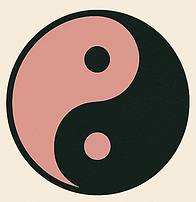Busting the Myth: Pleasure and Stress Are Opposites — Or Are They?A Sacred Inquiry Through Taoist Tantra
- auroralulu33
- Aug 7, 2025
- 3 min read

Have you ever noticed how pleasure can sometimes feel like a secret gatekeeper—something you only earn after satisfying others? Or how stress can build invisible walls, making joy seem impossible? What if these experiences aren’t just life’s quirks but clues pointing toward deeper energies at play within you?
In Taoist Tantra, pleasure and stress are not simply enemies on opposite sides. Instead, they are partners in the dance of life, yin and yang weaving together, inviting us to explore how embracing their complex interplay can transform our energy, connection, and vitality.
Let’s gently explore some common beliefs about pleasure and stress, illuminated by the loving light of these ancient traditions. Consider each True or False statement carefully—feel into what your body and heart whisper as you read.
1. You only deserve pleasure after you have pleased someone else. — False
In Tantra, pleasure is sacred and internal—not contingent on how much you please others. It is the flame of Shakti, your creative life force, always present and eager to be honored. Taoism invites you to be like flowing water that nourishes itself before it nourishes the earth. You deserve pleasure simply because you are! Your body is your primary relationship. Pleasure is a natural current, not a trophy earned through external deeds.
The dance of giving and receiving flows best when your own vessel is full. (100% of your job is filling your cup.) Pleasure awakens your heart center, expanding your capacity to love and connect beyond the self—without debt or conditions.
2. Stress can create a barrier that makes pleasure impossible. — Partly True, but only if we don’t flow with it
Stress is a ripple in your energy—an interruption, not a wall. Both Tantra and Taoism teach that energy flows in cycles: moments of tension must exist for release and renewal to arise.
Taoist practice invites you to move with stress like a river around a rock—allowing it to shape but not block your flow of qi (life energy). Tantra calls for presence with discomfort, seeing it as a threshold to deeper sensation rather than a halt.
When you pause and breathe into stress, you create space for pleasure to ripple through even the tightest places. Pleasure and stress can coexist, their tension birthing new openings for vitality and presence.
3. Fantasy is more pleasurable than reality. — False, but with a nuanced Tao-Tantric truth
Fantasy is a playful expansion of your inner world—a swirling dance of imagination that can enliven your spirit. Yet, Tantra and Tao remind us that true pleasure blossoms when fully embodied in the present reality, the “here and now.”
Taoist practice anchors you in your body’s subtle energies, transforming imagination into real sensation. Tantra elevates conscious touch, mindful breath, and deep connection into portals for ecstatic presence beyond mental constructs.
Pleasure rooted in fantasy alone floats free, but focused full body pleasure radiates richer, fuller energy, weaving heart, body, and soul into a beautiful ecstatic experience.
4. Pleasure and pain can never happen at the same time. — False
One of Tantra’s most profound teachings is that joy and discomfort are not enemies but dance partners. Pleasure often blooms through pain and tension—like lotus flowers rising from muddy waters.
Taoism honors this co-existence as the interplay of yin and yang. Pain awakens sensitivity, and pleasure softens resistance. This tension creates the texture of life’s deepest sensations and invites a holistic engagement with being.
Awakened presence means holding both light and shadow without denial, discovering that pleasure’s edge often lies in embracing the full spectrum of experience.
5. Self-pleasure ruins intimacy and connection in relationships. — False, and quite the opposite
Far from diminishing connection, Tantra and Taoist traditions celebrate self-pleasure as a vital act of self-love and energetic cultivation. Taoism teaches that circulating your own sexual energy nurtures your jing—your essence—strengthening your vitality and deepening your capacity to share with a partner.
Tantra views self-pleasure as sacred communion with your own body, opening channels for vulnerability, trust, and richer intimacy within relationships. When you honor your own pleasure fully, you bring a grounded, radiant presence to the dance of union—inviting deeper connection and understanding.
A Loving Invitation
Today, invite yourself to soften into one belief you’ve held about pleasure or stress. See if you can meet it with curious kindness, as both Tantra and Taoism teach us to do. Perhaps that “guilty” pleasure is an unspoken path to your life force—and a gateway back to greater ease, energy, and love.
Pleasure is not a distant reward or an enemy of stress—it is your natural companion, flowing with you in the mystery of life’s dance. Listen to your body, breathe gently, and welcome the sacred interplay unfolding within.




























Comments